Weekly Dribble: Don't make this mistake again, and the wall called Spurs
Weekly dose of FPL stuff, transfers, and everything I find interesting
Welcome to a weekly edition of the Data Dribble! 👋
For a full experience which includes 2 in-depth articles, weekly consulting-style Q&As, or private Discord server, consider becoming a premium member—it costs like Big Tasty at McDonald’s (in UK, but still…) ⭐
This is one of the most worthless stats around
The goal of the Data Dribble is to teach you how to use data in football properly and to apply that knowledge in your decision-making process.
It doesn’t matter if you play FPL, DFS, or bet on sports. You might also be a sports journalist seeking to enhance your storytelling skills, or simply someone who loves the game and wants to deepen their understanding of it.
Often, I tell you that historical AND contextualised data are good enough predictors of future events.
"Contextualised” is important here.
It’s similar to real-life football—you achieve the best results by combining data, traditional scouting methods, and tactical analysis.
I won’t take screenshots, and I’ll let AI rephrase it because I don’t want to mock anyone. I just want to debunk this widespread misconception that really bugs me to see on X/Twitter over and over again.
Alright, the tweet, which I see in various versions across the whole season:
Don’t hesitate to captain Driblo Tacklesson!
He has scored 8 goals and made 4 assists in his last 7 matches against Fulham, clearly enjoying the opportunity to shine against his former side.
With Fulham being lazy in the transfer market, this could be a goal-rich clash.Another version of it:
Every time he lines up against Everton, he’s guaranteed a goal or assist — a truly terrifying record!
7 goals and 3 assists in 7 games.
Oh, yes, he’s playing them next weekend…It. Doesn’t. Matter.
Any of it.
The keywords in both cases are “6/7 games”. That’s three, or perhaps three and a half, seasons? Yes, it was the same team, but under very different circumstances.
That player had many different teammates over the years.
The opposing team looked different each time.
In some matches, the opponent might have been missing key player(s).
Some matches were played at home, while others were away (duh).
The managers could have been different for either side or both.
The tactics could have changed considerably.
Those matches took place at various points in the season.
The referee was likely different each time.
A player might have been on a hot finishing streak.
Claiming that a player’s past performances in a large-ish sample of matches against a specific opponent directly predict their future performance against that same opponent holds no real predictive value.
We are probably discussing a player who is... good. And happened to play well. That’s all.
There are far better ways to determine if a player is a good captaincy pick in the upcoming match. The next time you come across those posts, keep scrolling.
People trying to establish a direct link between pre-season results and in-season performances is another misconception. It simply doesn’t exist.
Preseason results have little predictive power for how teams will perform during the actual season.
I wrote a whole thread about it:
Generally, events in a low sample size are mostly noise.
I’m not claiming there are no signals, but again, you need to consider the right context. I think I will make this mythbusting a regular feature of this newsletter.
Let me know in the comments what you think.
João Palhinha: The perfect match?
Spurs parting ways with Ange Postecoglou and signing Thomas Frank was one of the most intriguing stories of the summer. Some might say that Arsenal hijacking the Eberechi Eze deal was absolute cinema, but we won’t discuss it here…
Anyway, Frank’s top priority as the new Spurs manager was to improve the defence. Defending transitions, slow positional attacks, set pieces, or preventing them from being vulnerable when counter-pressed. You name it.
Spurs were ranked as the 4th worst for xG conceded last season, meaning only relegated teams allowed more dangerous shooting opportunities. The script is clear long before the new Premier League campaign started—Frank will improve the defence, and fans will love him for that.
Not only because it’s usually the first thing a new manager does, but also because implementing his ideas in the final third takes more time.
Not only because he’s on the more pragmatic side and values defending in a compact fashion.
But also because last year’s results were largely circumstantial. Injuries affected almost everyone, INCLUDING Cristian Romero and Micky van de Ven. At some points in the season, they played with a centre-back pairing of 18-year-old Archie Gray and veteran Ben Davies.
One isn’t really a centre-back. The other played very little the season before. In some of those games, they also missed Rodrigo Bentancur, who could at least do some defending to offset the horrendous situation at the back. It wasn’t the players’ fault—there’s only so much you can do in such situations.
Currently, there’s not only Frank, but also a healthy *knocks on the wood” duo Romero & Van de Ven.
There’s also Pedro Porro, who had an excellent season last year in terms of defensive performances, but hardly anyone talked about it (though it’s not entirely unexpected).
This season, there’s also a new piece of the puzzle—João Palhinha. Both Spurs and Frank needed this pure, destroyer-style number 6, and he’s exactly that. He’s a player who can frequently regain numerous possessions in the most crucial areas, mainly thanks to his excellent tackling.
In Fulham, he ranked in the 99th percentile for tackles volume while maintaining a success rate in the 87th percentile.
That’s huge.
He also helps you to overcome some issues with set pieces on both ends of the pitch.
Some were calling for someone who could provide more value on the ball, but you can’t look at things in isolation. Within the Spurs team, there are several ways to address that he’s not someone who dictates the tempo or aids in chance creation. The key is buying an exact typology to improve the team as a whole. And he’s precisely that.
As I mentioned, pre-season and early fixtures can be noisy. However, when it comes to the Spurs’ defence, there are several signals that it might work just fine. With a favourable run of fixtures and reasonable prices for their players, their defence is certainly attractive in FPL.
Anyway, I’m eagerly awaiting what will happen in the final week of the summer transfer window. You might get another Spurs deep dive before Gameweek 4…
Tweets of the week
Alright, I’m on holiday, so let’s keep this week’s edition a bit more relaxed.
We started with some “imaginary” tweets, so let’s finish with some real ones.
This one from Tom is probably the best reminder on how to handle a bad start in FPL I’ve come across this season:
There is so much attacking talent in the league that predicting clean sheets is often challenging.
In the 2018/2019 season, Premier League teams conceded an average of 44.88 xG (1.18 per 90).
However, this rose to 54 xG (1.42 per 90) in 23/24 and 52 xG in the previous campaign.
It’s all about setting realistic expectations:
Alright, the final one.
Great question, even better response:



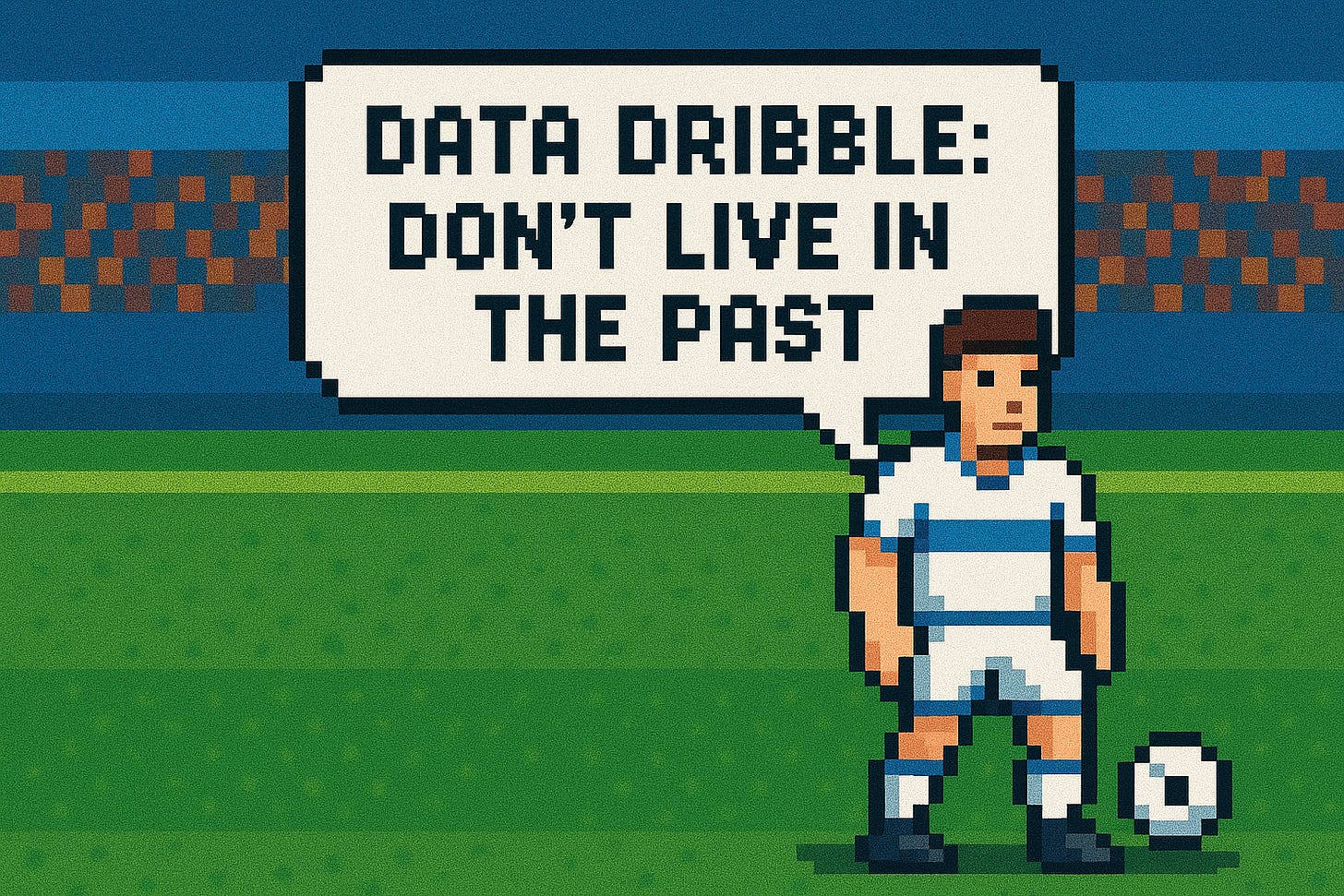
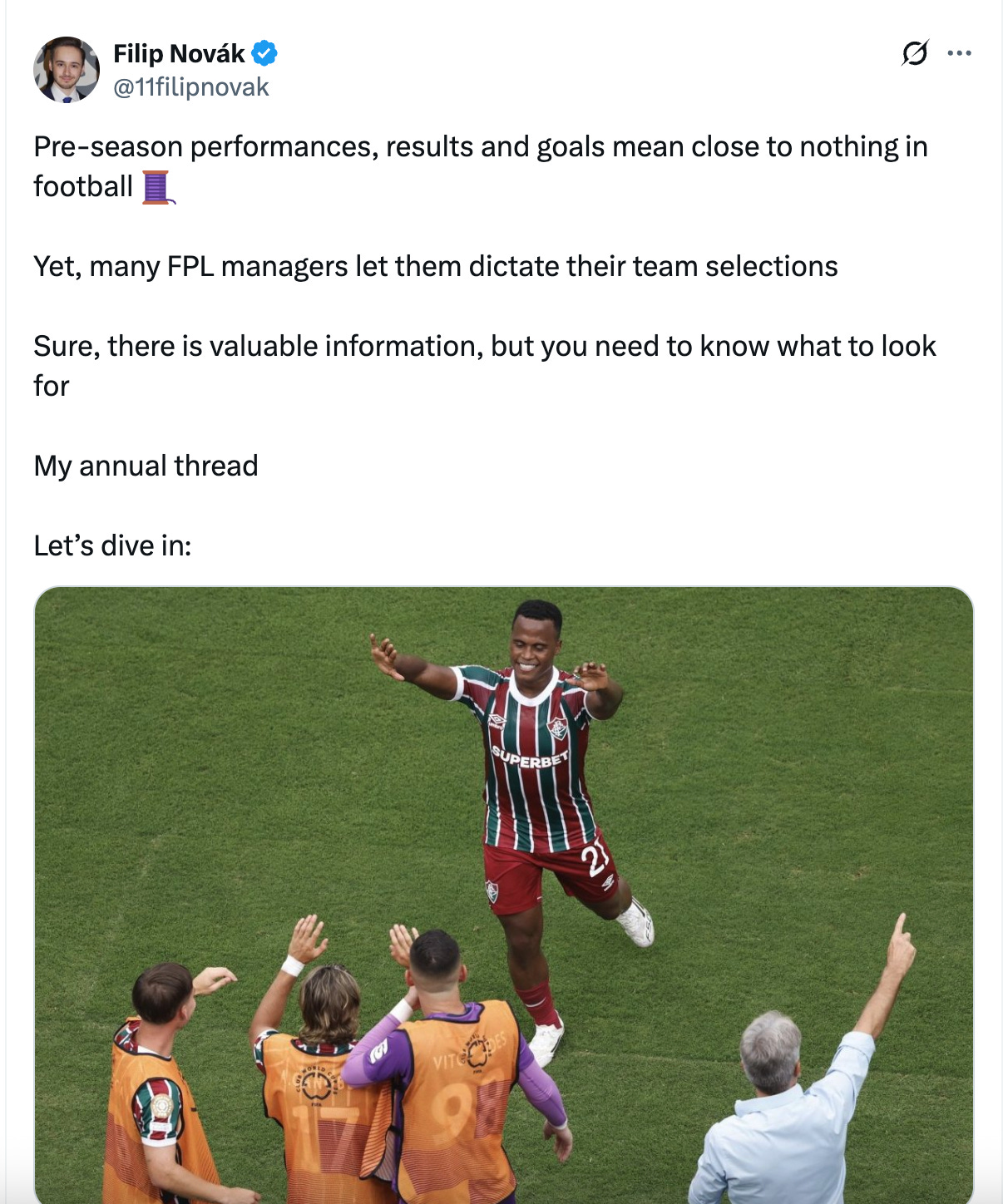

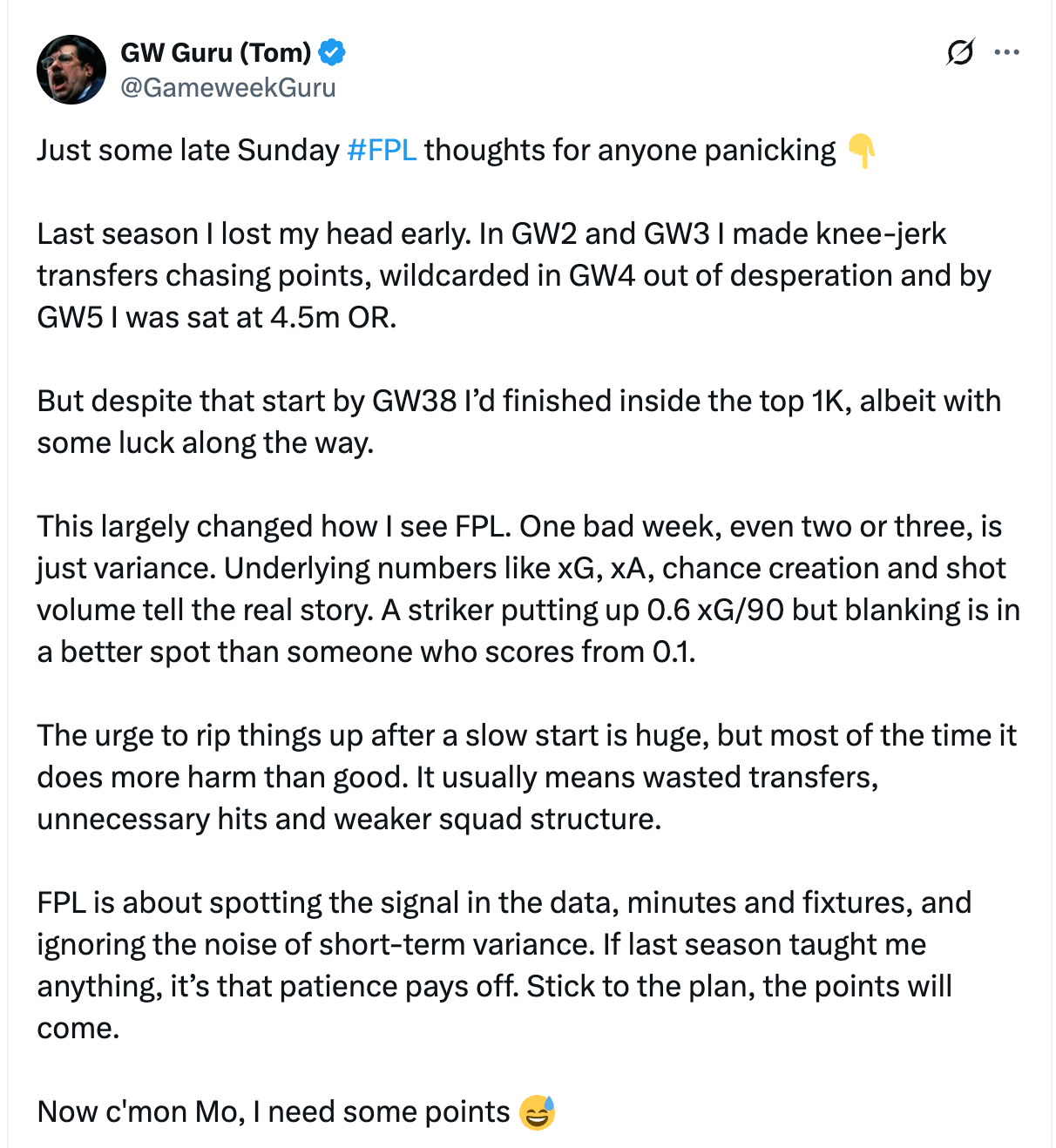
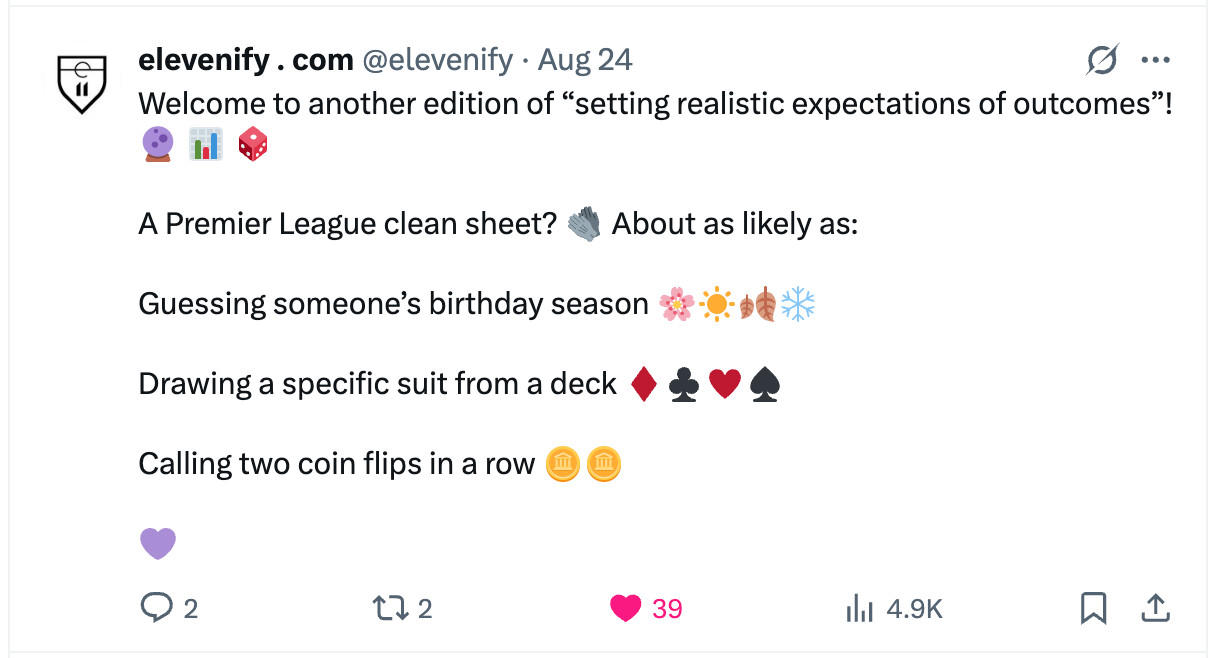
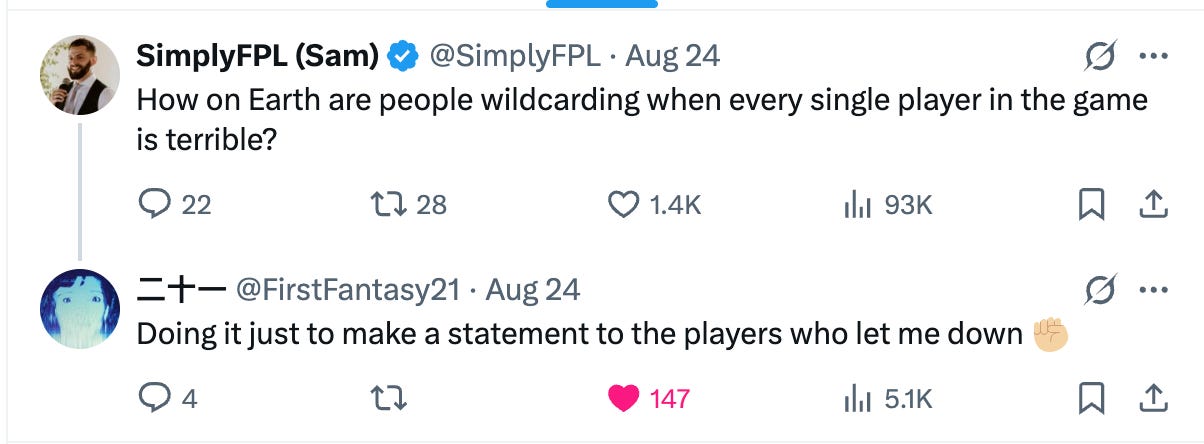
I’m sensing you don’t think targeting Sarr vs Villa based on how well he did against them last year is a good idea then? 😂